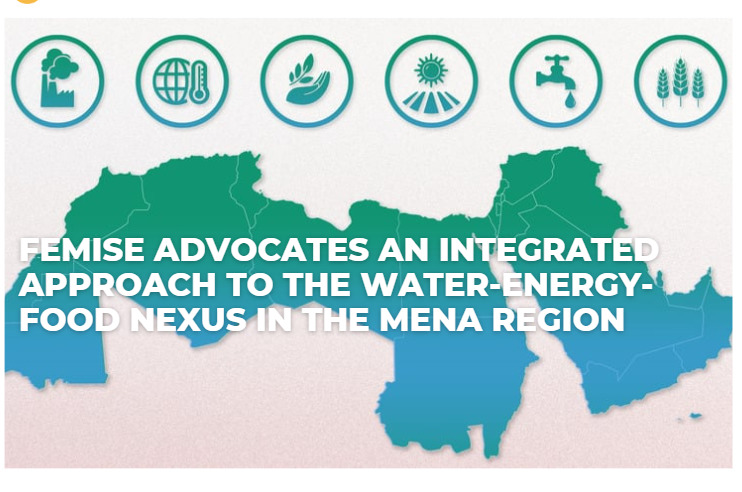
Get the full digital edition of the article ln English et en Arabic
Aggravated water stress, food insecurity and energy crisis…. Countries in North Africa and the Middle East are facing extreme strain on natural resources in a context of increased pressure on the environment. How to manage these challenges ? Involved in the WEF-CAP (Technology Transfer and Capitalization of Water Energy Food Nexus) project, FEMISE analyzes the impacts of climate change in the Mediterranean. In its policy brief entitled “Opportunities for an Integrated Water-Energy-Food Nexus approach in the MENA region: Egypt, Jordan, Lebanon & Tunisia”, the Forum advocates an integrated approach to Water-Energy-Food (WEF) governance by detailing the opportunities and levers for action for each country.
A limited resource, water is becoming increasingly scarce in Jordan, Lebanon, Tunisia and Egypt, on the brink of shortage. The Nile is no longer enough to quench the thirst of Egyptians in the face of the demographic explosion.
Why not develop seawater desalination units, use wastewater, recycle nutrients? Why not rehabilitate and optimize the water supply infrastructure in Tunisia, using photovoltaic energy to pump sea water and transform it into fresh water? By irrigating its crops with wastewater, by deploying an intelligent irrigation system, Lebanon would save its water resources. Detecting water leaks in Jordan would be a significant step forward, as would the use of wastewater to water crops.
Priority to water conservation
So many concrete avenues put forward by Femise to improve water management. The subject is at the heart of the concerns of the countries of the Middle East and North Africa. Public policies, historically organized in silos and marked by fragmented management of resources, are giving way to a new paradigm. That of promoting an integrated approach to the governance of the Water-Energy-Food Nexus (WEFN) that promotes complementarities between sectors.
“Clearly, ensuring sustainable agriculture requires tackling the water-energy-food challenges in an integrated approach rather than individually while prioritizing the preservation of water, which constitutes a finite and irreplaceable resource fundamental to human well-being”, argue Dr. Maryse Louis and Sophie Dadouh, experts in Mediterranean socio-economic issues within Femise and authors of the policy brief. The countries of the southern Mediterranean and the Middle East are among the regions of the world most affected by the consequences of climate change and must lead the deployment of measures in favor of the green transition while respecting the commitments made in 2015 during the Paris Agreement. With supporting figures, FEMISE details the dramatic consequences on the populations of the Maghreb and the Mashrek of the change in weather conditions. Rising temperatures, extreme weather events and declining water resources affect crops with a significant drop in yields. “According to FAO, the number of severely food insecure people in North Africa has increased from 21.1 million in 2019 to 28.3 million in 2021”, emphasized FEMISE.
The health crisis and the war in Ukraine have worsened an already alarming situation causing tension on the price of cereals and an unprecedented crisis in energy prices. “In Jordan, over 97% of Jordan’s cereal food and feed requirements in 2022 are met by imports, increasing the country’s vulnerability to external shocks”, analyzes Femise. Populations are becoming precarious, impoverished. “28 million people in the MENA region still lack access to electricity, mainly in rural areas”, the policy brief stresses.
An integrated WEF Approach: WEF Mediterranean Council
Within the framework of an integrated governance of the Water-Energy-Food Nexus (WEFN), the creation of a WEF Mediterranean Council will contribute to a better regional coordination. The increased share of renewable energies (wind, solar, hydroelectricity) in the energy mix, raising awareness and promoting innovation and technology among the youth should promote the emergence of a more efficient and sustainable management of resources and help move towards energy sovereignty.
Acknowledgment: 
- This article is based on the WEF-CAP policy Brief No. 2 entitled: https://www.femise.org/slideshow/wef-cap-policy-brief-no-2-opportunites-pour-une-approche-integree-du-nexus-eau-energie-alimentation-dans-la-region-du-moan-egypte-jordanie-liban-et-tunisie/
- This Article is produced in the Context of the WEF-CAP Project (THE TECHNOLOGY TRANSFER AND CAPITALIZATION OF WATER ENERGY FOOD NEXUS) and received financial contribution from the ENI CBC Programme which is supported by the European Union through the Grant Agreement nº C_A.2.1_0069 running from 1st of September 2021 to 31th of August 2023.
- The views expressed in this article as those of the authors and do not reflect the views of the ENI CBC MED Programme or their partners.



